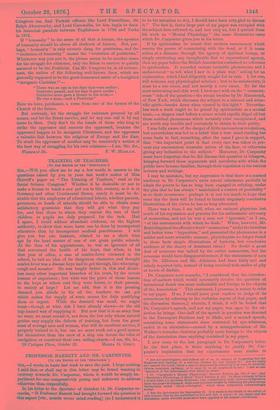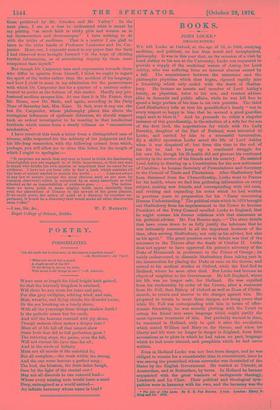PROFESSOR BARRETT AND DR. CARPENTER.
[TO THE EDITOR OF THE "SPECTATOR.")
wrote in haste last week to save the post. I hope nothing I said then or shall say in this letter may be found wanting in courtesy towards Dr. Carpenter, whom it would be simply im- pertinent for one comparatively young and unknown to address otherwise than respectfully.
In his letter to the Spectator of October 14, Dr. Carpenter re- marks, "If Professor Barrett had brought forward the question in this aspect [viz., muscle versus mind-reading] (as I understood it to be his intention to do), I should have been very glad to diatom it." The fact is, that a large part of my paper was occupied with the subject here referred to, and not only so, but I quoted from his work on "Mental Physiology" the same illustrative cases which Dr. Carpenter gives you in his letter.
If by spiritualism be meant that modern necromancy which asserts the power of communing with the dead, or if it mean action at a distance through the agency of spiritual beings, or simply attributing any inexplicable fact to supernatural agency, then my paper before the British Association contained no reference to spiritualism. It recorded certain veritable phenomena, and I endeavoured " to tell what I saw in a plain way," asking for an explanation, which I had diligently sought for in vain. I, for one, will welcome any physiological solution ; but to be satisfactory, it must be a Iota cause, and not merely a vera cause. By far the most interesting and able work I have met with on the " common- sense" side of the question—the recent treatise by Dr. Hammond, of New York, which discusses the subject in a rational and scien- tific spirit—breaks down when viewed in this light.* Neverthe- less such a work ought to be prized by spiritualists as a mental tonic,--a chapter read before a seance would rapidly dispel all but those residual phenomena which certainly exist unexplained, and are worth any trouble and contumely to obtain in their purity.
I was fully aware of the danger of little unconscious revelations, but nevertheless was led to a belief that a true mind-reading has some basis in fact, remarking, after the cases I gave in support, that " the important point is that every care was taken to pre- vent any unconscious muscular action of the face, or otherwise giving any indication to the subject." Moreover, Dr. Carpenter must have forgotten that he did discuss this question at Glasgow, bringing forward those arguments and anecdotes with which the public have become familiar, through their repetition in his various lectures and writings.
I may be mistaken, but my impression is that there is a marked tendency in Dr. Carpenter's more recent utterances partially to admit the points he has so long been engaged in refuting, under the plea that he has always " maintained a reserve of possibility" as to their occurrence ; perhaps it is not too much to hope that some day the facts will be found to furnish singularly conclusive illustrations of the views he has so long advocated.
There was a time, I am told, when an eminent physician lost much of his reputation and practice for his enthusiastic advocacy of mesmerism, and yet he was a man not "ignorant," as I am, "of the instruments with which he dealt." When, however, Mr. Braid disguised the offensive word " mesmerism" under the harmless and better term " hypnotism," and presented the phenomena in a milder and more scientific manner, physiologists no longer found in these facts simple illustrations of hysteria, but conclusive evidence of the theory of dominant ideas.t No doubt a great deal of nonsense was talked by the earlier mesmerists, but the nonsense would have disappeared sooner, if the statements of men like Dr. Elliotson and Mr. Atkinson had been fairly met and calmly inquired into, instead of being received with smiles of pity or howls of disdain.
Dr. Carpenter next remarks, "I considered that the introduc- tion of matters which would necessarily involve the question of intentional deceit was most undesirable and foreign to the objects of the Association." This statement, I presume, is meant to refer to my paper. If so, I would leave your readers to judge of its correctness by referring to the verbatim report of that paper, and the discussion thereon,t wherein, I think, it will be found that Dr. Carpenter's speech, and not my paper, was open to the ob- jection he brings. One-half of the speech in question was devoted to the Davenport Brothers and to Slade, and a second speech, containing some statements since corrected by eye-witnesses, ended in an altercation—caused by a misapprehension of Mr. Wallace's remarks—features probably more foreign to the objects of the Association than anything contained in my paper.
I now come to the last paragraph in Dr. Carpenter's letter. In the first place, is there anything to justify Dr. Car- penter's implication that my experiments were similar to
• Are not neurologists, and indeed all of us, in danger of forgetting that the diagnosis and naming of a nervous disease do not explain it? Are we really any nearer the truth, when a case is dismissed by referring it at once to hysteria., chorea, catalepsy, epilepsy, or it may be to all combined in one ? I ask as one "ignorant of the instruments with which he deals." t CJ. "Carpenter's Mental Physiology." Second Edition, pp. 615, et seq. ; and "Maudsley's Physiology of Mind," Third Edition, p. 319. To these eminent writers I would refer the Saturday Reviewer, who, commenting with virtuous indignation upon my paper at (ilasgow, finds such innocent delight in ridiculing the phenomena barbarously called "electro-biological," which these authorities unhesitatingly accept. I See the Spiritualist for September 22. It is much to the credit of the editor of that journal that he has published so full and fair a report of my paper and the discussion, much wherein must have been opposed to his firmest convictions.
those published by Mr. Crookes and Mr. Varley? In the next place, I am at a loss to understand what is meant by my putting "as much faith in tricky girls and women as in my thermometers and electroscopes." I have nothing to do with the tricks of mediums. That is a matter I am glad to leave in the abler hands of Professor Lankester and Dr. Car- penter. Moreover, I expressly stated in my paper that the facts I had observed were brought forward " in the hope of eliciting further information, or of stimulating inquiry by those more competent than myself."
But though Dr. Carpenter uses such expressions towards those Who differ in opinion from himself, I think we ought to regard the spirit of the writer rather than the accident of his language, and here I yield to none in my admiration for the perseverance with which Dr. Carpenter has for a quarter of a century endea- Voured to arrive at the bottom of this matter. Hardly any pro- fessional medium escapes him. At one time it is Mr. Foster, then Mr. Home, now Dr. Slade, and again, according to the Daily News of Saturday last, Mrs. Kane. In fact, were it any one else but Dr. Carpenter, whose philosophy places him above the Contagions influences of epidemic delusions, we should suspect such an ardent investigator to be wanting in that intellectual fortitude which comes from a steady reliance on "unconscious cerebration."
I have received this week a letter from a distinguished man of science, alike respected for the sobriety of his judgment and for his life-long researches, with the following extract from which, perhaps, you will allow me to close this letter, for the length of which I ought to apologise
"It surprises me much that any man is found to think the fascinating investigation you are engaged in of little importance, or that any man is found who thinks his own opinion so important that he cares for no evidence. I have not yet been able to find a book which contains all the laws of nature needed to sustain the world I am not aware of any law of nature (except the most obvious, such as are seen by Common observers) which is sustained by so many assertions so well attested as far as respectability of evidence goes. The indica- tions we have, point to some mighty truth more decidedly than even the aberrations of Uranus to the newest of the great planets. If we could prove the action of mind at a distance by constant ex- periment, it would be a discovery that would make all other discoveries seem trifles."
—I am, Sir, &c., W. F. BARRETT.
Royal College of Science, Dublin.



































 Previous page
Previous page